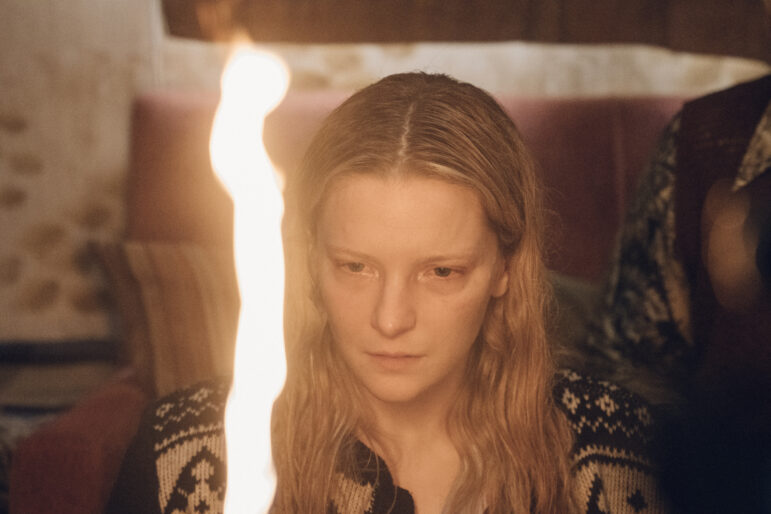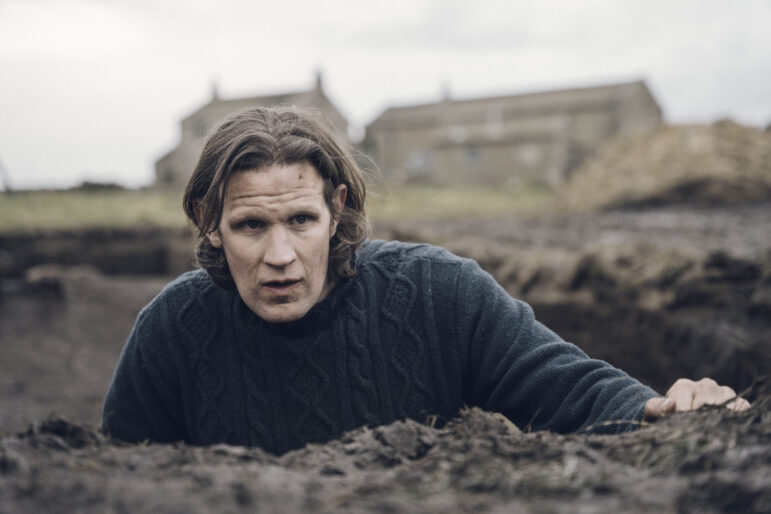
Editor’s note: This review mentions the death of a child.
“What you go searching for and what you find aren’t always the same,” writes Andrew Michael Hurley in his 2019 novel Starve Acre, which was later adapted into a 2023 film.
Critics often seem tempted to interpret any film that deals with the difficulties within a family as domestic horror, but Daniel Kokotajlo’s 2023 folk horror film Starve Acre simply doesn’t fit the bill. Searching for that tension, I found something else.

Morfydd Clark as Juliette in “Starve Acre” [BFI Distribution]
Richard and Juliette (Matt Smith and Morfydd Clark) have left behind some unnamed English city to seek the simplicity of his ancestral home in Yorkshire. Their son Owen (Arthur Shaw) adjusts to the move with difficulty, acting out in disturbing ways including maiming a birthday party pony. After this shocking incident, the parents seek help for their son. No help is forthcoming, and we see them saddled with the heartbreaking burden of a child who is perhaps a budding psychopath, or perhaps only misunderstood.
Domestic tension abounds as Juliette reveals to Richard that family friend Gordon (Sean Gilder) has been telling the child folk tales from their new locale. Richard insists that he see the child no more, while Juliette assumes there’s more to this story. Suspecting her son is hearing voices, she remains open to new information even as we see her husband shut down. When eight-year-old Owen dies of a serious asthma attack, their gap only widens. Juliette’s grief grounds her in bed, while Richard goes into the ground itself.
An archaeologist with some barely-explored academic associations, Richard is digging in the land surrounding this family home and seems to hit the motherlode. We see him brushing dirt from startling artifacts he describes as Jutish, one of the old Germanic tribes that settled Britain after the Romans, in an aside to a colleague. However, there is something more unsettling in the land and he knows it. Through a combination of his father’s diaries, recounted local legend, and Owen’s half-formed sleep utterances, the audience receives hints about a huge oak tree that once represented a gate between worlds. The story obscures; Richard uncovers.

Matt Smith as Richard in “Starve Acre” [BFI Distribution]
The magic in Starve Acre is mostly oblique and in the past, except for two explicit scenes. Gordon’s wife (Melanie Kilburn; the character has no first name) comes to comfort Juliette in her grief. The two women are joined by Juliette’s sister Harrie (Erin Richards). They sit in a darkened living room, a candle burning, and engage in the old woman’s stated specialties: yoga, meditation, that sort of vague New Age vibe.
Chanting om mani padme hum, the three attempt to shepherd Juliette toward the release of her dead child. Instead, the room becomes charged with an unseen energy, causing candles to flare and objects to move. Mrs. Forde rapidly changes her utterances from om vajrapani hum, invoking the thunderbolt this time instead of the contemplative lotus, to whispering that “the dandelion is in the bud.” This cryptic allusion to the local spirits goes unquestioned as the women flee the terror of the room.
The second scene is Mrs. Forde once again, addressing the unburied stump of the mythical oak tree out in the field. Once discovered, the oak is surrounded by remains of the kind associated with Frazer’s concept of the sacred king as described in The Golden Bough: bodies sacrificed via hanging, burning, bludgeoning, or all three. As is the style in British folk horror, the myths and beliefs are never fully explained ,but only hinted and alluded to, allowing the viewer’s mind to populate the empty space with the profound and profane imagination.
In each of these, an interesting balance is struck. Mrs. Forde describes her practices in a way that is recognizable to the university-educated young people, by mentioning the Eastern mysticism and self-care discipline so neatly packaged in the West as to become indecipherable products, unconnected with any larger religious contexts. Beneath that veneer lurks a folk practice that is centuries old, and specific to not only Britain but to this very locality. The god/wood sprite/figure they invoke is called Jack Grey, the oak is the Whistling Tree; all of this is hyper-local. Call it yoga all you like, but what these people are really into are their immediate land spirits.
In this, Starve Acre is a very Pagan movie indeed. These people are paganus — the country villagers who wouldn’t recognize your gods if you showed them the Pantheon. They’ve got their own, as immediate and real as their own crops and just as crucial to their existence.
By clothing the film’s main practitioner in traditions and mantras from another continent, Starve Acre pulls off a trick like a rabbit from a hat. Magic and meditation and the occult are always from somewhere else, belonging to the other. British identity is Enlightenment-coded, evolved past folk belief and sensible in its bloodless Christianity. But reach deep enough into that black silk hat or the rich black earth and presto! Yorkshire isn’t London; they still get down and propitiate the gods out there.
Starve Acre is domestic horror only in the sense that Britain itself is the domicile. Reaching out into the former empire to commoditize Hinduism and use it as a mask, it locates rationality in the city, in the university, in the mind that knows the oak tree was only ever an oak tree. But dig just a few inches into the soil and a riot of irrational myth and impossible happenings is always just below this family’s feet. As inescapable as their son’s mental illness and as impossible to understand, this family is haunted not by the roles they must play, but by the history and cultural meaning they strenuously deny. The old villagers come not to trap them in their duties as parents, but to make them stewards of the land and the land’s unruly spirits.
A quiet, peaceful place in which to raise a child is what they seek. What they find is that the quiet is an illusion, the peace is built upon corpses, and raising a child isn’t the neutral act they’ve been led to believe it would be.
It never is.
Starve Acre is available for rental on YouTube and AppleTV+.
The Wild Hunt is not responsible for links to external content.
To join a conversation on this post:
Visit our The Wild Hunt subreddit! Point your favorite browser to https://www.reddit.com/r/The_Wild_Hunt_News/, then click “JOIN”. Make sure to click the bell, too, to be notified of new articles posted to our subreddit.